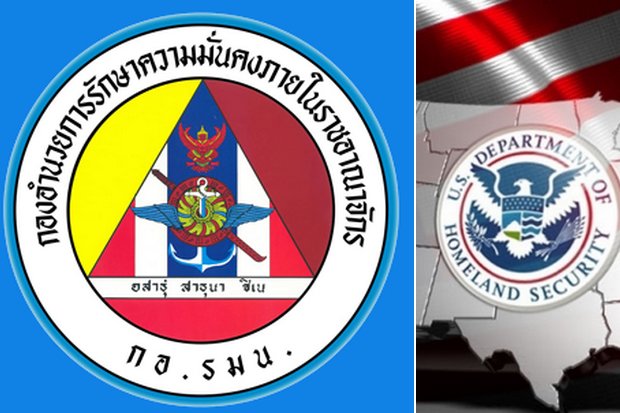
Talks about setting up a new security ministry to cope with emerging security threats have never been more timely in the wake of the Aug 17 Erawan shrine bomb attack that killed 20 people and injured 130 others.
While Thai authorities have yet to conclude the motive behind the attack, security sources said the idea of establishing a special ministry, in the same format as the US Department of Homeland Security, is being revived.
After the Sept 11, 2001 attacks, the US in 2002 introduced the Homeland Security Act to create the Department of Homeland Security.
According to security sources, there are indications the Bangkok bombing may be linked to Thailand's handling of Uighur migrants. The deportation of 109 Uighurs to China in July has sparked an international outcry and upset the ethnic Uighurs.
- Crime Track: 200 detectives sent back to school
Even if the probe into the bomb attack uncovers another cause being pursued by police -- that the blast is the work of disgruntled human trafficking networks -- threats of violence against the country remain real and might worsen if crime syndicates are bent on taking revenge, the sources said.
Moreover, Thailand also faces threats of international terrorists with reports suggesting Islamic State is active in some Southeast Asian countries and its agents may try to sneak into Thailand. Security will become more challenging after the launch of the Asean Community by the end of this year.
The proposal for a security ministry was also raised last week by the National Defence College Class 57 during an event attended by Prime Minister and chief of the National Council for Peace and Order (NCPO) Prayut Chan-o-cha.
Gen Prayut welcomed the proposal and added the agency should link all security-related agencies, possibly including police, to streamline and integrate efforts in handling security affairs.

Current planning is to upgrade the Internal Security Operations Command (Isoc) into a Ministry of Security, similar to the US Department of Homeland Security formed after the 9/11 attacks in 2001.
He went on to say he had invoked Section 44 of the interim charter to bring the Internal Security Operations Command (Isoc) and the Southern Border Provinces Administrative Centre under his supervision as both agencies were deemed to have problems.
This could be the starting point of the proposed security ministry, sources said.
The idea of setting up the security ministry has been in the pipeline for years.
The original plan essentially called for the upgrading of Isoc into a ministry, but has moved on since.
Following the September 2006 military putsch that ousted the Thaksin government, Isoc was eyed to take on a role similar to the US Homeland Security Department.
Those musings led to the enactment of the Internal Security Act in 2008, which changed the face of Isoc -- from a place to keep inactive military officers to a core security agency that has the prime minister as the director and the army chief as deputy director.
Under the law, Isoc has a new structure with six wings dealing with drug trafficking, illegal migrant workers, terrorism and transnational crime, cracking down on deforestation, tackling violence in the South, promoting royal projects and protecting the royal institution.
The National Security Council (NSC) has recently floated the plan to upgrade Isoc into a ministry.
Outgoing NSC secretary general Anusit Khunakorn has clarified the agency's move which is to enable the country to cope with emerging security threats.
The new ministry could help the country integrate efforts in handling security affairs and cope with threats, he said.
Under the NSC's proposal, security agencies likely to come under the new ministry should include border patrol police, the National Intelligence Agency and the Special Branch Police.
Although he noted the armed forces are not included, the new ministry will have military staff who already work at Isoc.
The ministry will also deal with natural disasters and some areas of foreign affairs.
"We are working out the details before submitting the plan to the prime minister for consideration," he said.
A source in the Defence Ministry said the military supports the plan to set up a new ministry, but questions remain over whether certain security areas should fall under the supervision of the Defence Ministry or the new ministry.
"It needs to be designed carefully. Should internal peace-keeping operations, protests and demonstrations be handled by the Defence Ministry or the new ministry?" said the source.
Defence Minister Prawit Wongsuwan has reserved his opinions about the proposed ministry, saying he has already tried to integrate all security agencies under his supervision.